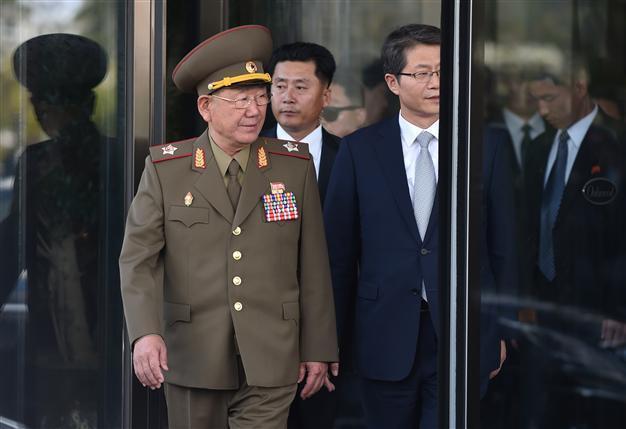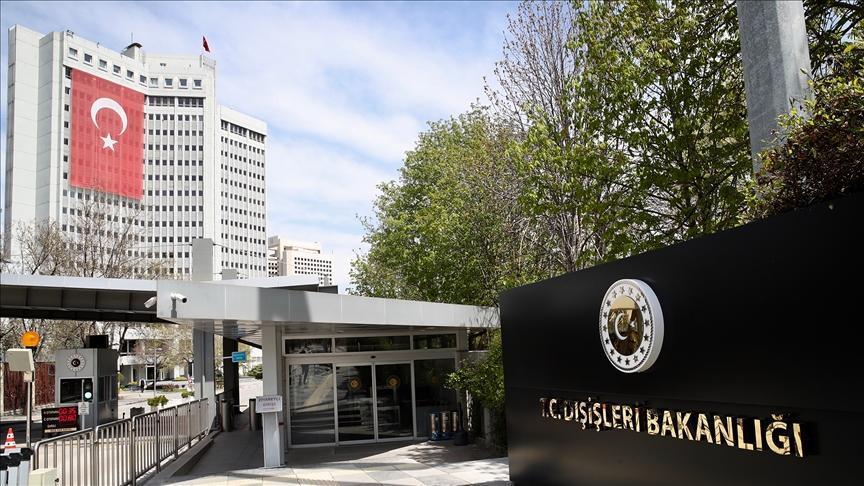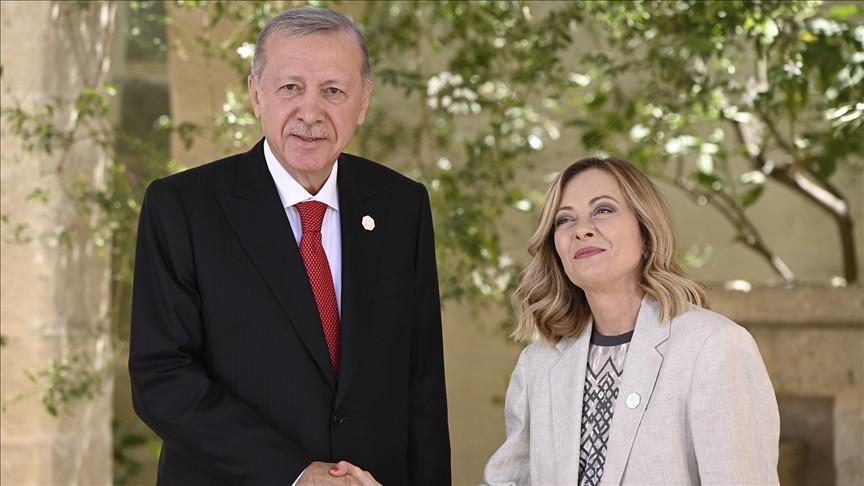Rare North Korea visit to South opens direct line to Kim
SEOUL - Agence France-Presse

North Korean Hwang Pyong-So (L), director of the military's General Political Bureau, the top military post in North Korea, walks with officials as he leaves a hotel at Incheon on October 4, 2014, following a meeting with South Korean Unification Minister Ryoo Kihl-Jae (2R), on the sidelines of the ongoing Asian Games. AFP Photo
A shock visit by North Korean leader Kim Jong-Un's closest aides to South Korea has opened a high-level communication between the two rivals that has been missing for years, analysts said Sunday.Whether it is a line of communication that will endure or produce lasting results remains to be seen, but Saturday's visit by a trio of top-ranking officials provided an opportunity that few saw coming.
"It's huge," said Andrei Lankov, a professor of Korean Studies at Kookmin University in Seoul.
"Apart from anything else, the level was pretty much unprecedented in terms of previous delegations to the South," Lankov said. "Essentially it provided a direct line to Kim Jong-Un."
It was led by Hwang Pyong-So, a newly elected vice chairman of the nuclear-armed North's powerful National Defence Commission who is widely seen as Kim Jong-Un's number two.
Accompanying him was another Kim confidante Choe Ryong-Hae and Kim Yang-Gon, a top ruling party secretary with responsibility for South Korean affairs.
The sudden visit was all the more surprising for coming after months of military tensions and vicious personal attacks in the North's state media against South Korean President Park Geun-Hye.
Seoul was only informed Friday of the trip, which was ostensibly made to coincide with the closing ceremony of the Asian Games in the South Korean port city of Incheon.
"This was clearly no pro-forma visit. It was a very big deal indeed," said John Delury, a North Korea expert at Yonsei University in Seoul.
"If you are Park Geun-Hye and you want a credible channel to the leadership in Pyongyang, then this is your dream team," Delury said.
One immediate impact was an agreement to resume a high-level dialogue that has been in limbo for seven months. The last round in February had resulted in the North hosting a rare reunion for families separated by the 1950-53 Korean War.
President Park, who came to office in early 2013, has repeatedly said the door to dialogue with Pyongyang is open -- even a possible summit with Kim Jong-Un -- but insists the North must first take a tangible step towards abandoning its nuclear weapons programme.
"She's not going to be speaking with Kim anytime soon, but in the meantime this visit was about as big as it gets," said Delury.
"It was a golden opportunity for Park and the South, even if its just in terms of better understanding who they are dealing with," he added.
Park did not meet the North Korea delegation. The Unification Ministry said she had wanted to, but their tight schedule ruled out a visit to the presidential Blue House.
Park's National Security Adviser Kim Kwan-Jin, who Pyongyang had labelled a "confrontation maniac" just a few months ago, was the top South Korean official at Saturday's meetings.
Kim Jong-Un has not been seen in public for a month, fuelling speculation that recent state TV footage of him limping reflected a serious health problem.
State media had acknowledged the young leader was in some "discomfort", but the message from the top-level delegation was unequivocal.
"There is nothing wrong with the health of Secretary Kim," Unification Minister Ryoo Kihl-Jae quoted Kim Yang-Gon as saying.
Delury said Saturday's visit was partly aimed at showing the North still has its house in order.
"It's a way of saying that, even if there might be something up with the leader, the system is fine and we are even able to make bold gestures like this," he said.
As relations with its most important ally China have cooled, North Korea has gone on a diplomatic outreach of late, even sending its foreign minister to the UN General Assembly for the first time since 1999.
"There's a bit of a charm offensive going on, and this visit was part of that," said Lankov.
"The timing may seem odd given the verbal attacks on Park, but we've seen many times in the past that when the North uses the foulest language, it means it wants to talk," he added.
The South provided few details of the substance of Saturday's meetings, and most analysts warned against expectations of a dramatic breakthrough.
"It's an important visit, but it shouldn't be seen as marking any great policy shift," said Professor Yoo Ho-Yeol of Korea University in Seoul.
"I can say certainly that we have made a very meaningful start," the unification minister said, predicting there could be "various types of dialogue from now".
But he suggested Seoul and Pyongyang should seek to solve pending issues step by step. "It's not good to be overly optimistic about inter-Korean relations."
The cash-strapped North would like a resumption of lucrative cooperative projects, such as South Korean tours to its Kumgang mountain resort, as well as the lifting of unilateral sanctions Seoul imposed in 2010.
















